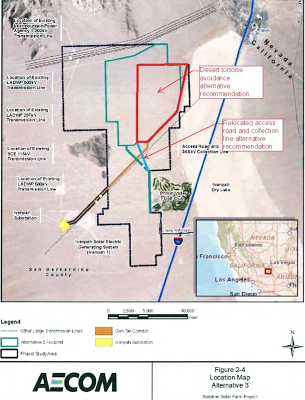More Destruction Looms Over Ivanpah

The Bureau of Land Management (BLM) is working on the final environmental impact statements for two more solar projects in the Mojave's Ivanpah Valley, which straddles the California and Nevada border, and the documents are expected to be released this summer. BrightSource Energy 's destructive Ivanpah Solar project is nearing completion there, but First Solar's proposed Stateline and Silver State South solar projects would destroy another eight square miles of intact desert ecosystem, with the most appalling destruction to occur at the 4.8 square mile Silver State South solar site. I hope at least one of the projects will canceled altogether or at least substantially trimmed down. First Solar's reputation as a steward of the environment is at stake, and the company has no reason to ignore Fish and Wildlife Service concerns; the company has successfully built large projects on already-disturbed lands with minimized environmental impacts. These Ivanpah proje...


